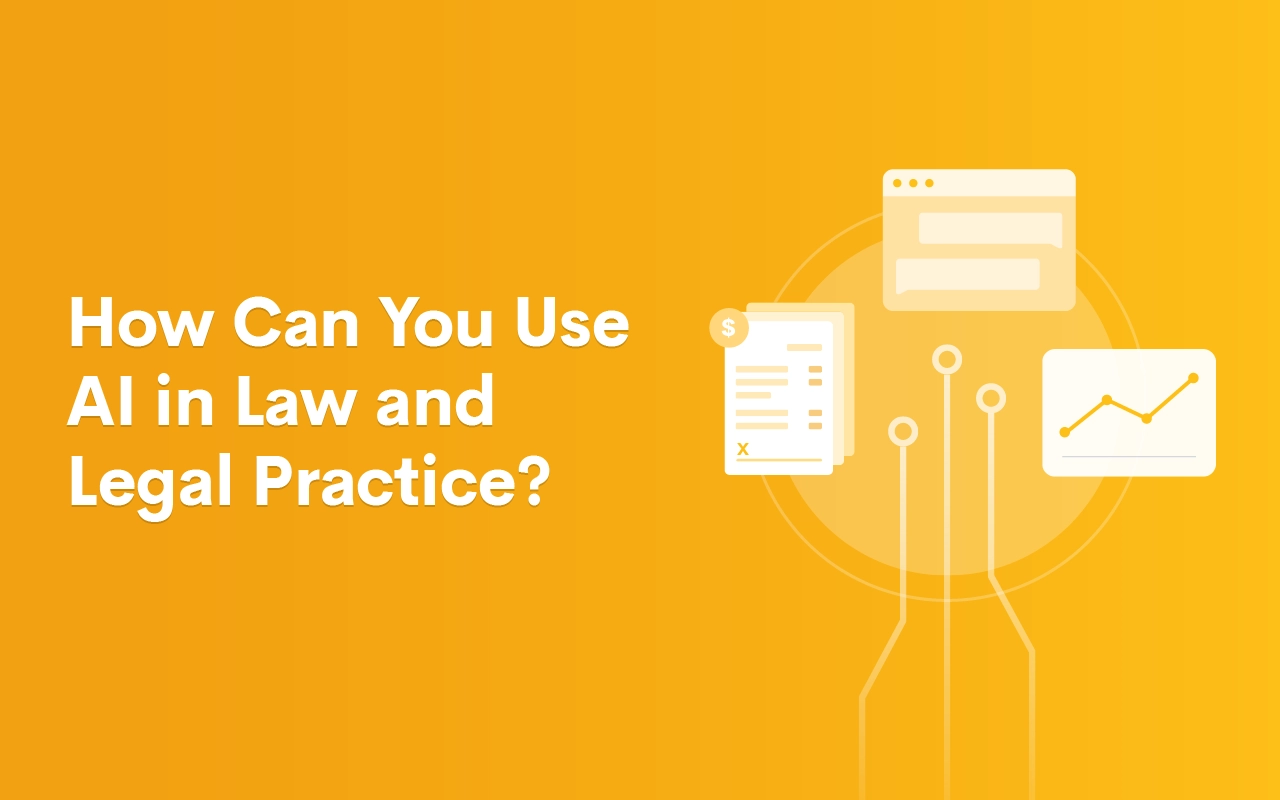How Can You Use AI in Law and Legal Practice?

Artificial intelligence (AI) seems to be everywhere these days, and it's definitely becoming a regular part of legal software, presenting law firms with advantages and risks that require consideration. Legal AI tools can significantly enhance law firm efficiency by rapidly analyzing document sets, automating workflows, and knocking out tedious tasks. Though not without some risks, AI thoughtfully deployed can prove transformative, allowing your firm to work more efficiently and deliver great client service.
What is the role of AI in the legal profession?
As AI capabilities progress, these tools promise to bring greater efficiency, speed, and optimization to law firms. By automating time-intensive tasks, AI enables staff to focus on high-value strategic work.
Law firms can leverage AI while establishing clear boundaries around its application. With proper training and oversight, legal professionals can harness AI to optimize operations and research while upholding rigorous professional and ethical standards. The smart approach is to view AI as a tool that can supplement, but not replace, skilled legal expertise.
Advantages and disadvantages of AI in your law firm
Integrating AI into legal practice presents opportunities and risks that require careful evaluation. Collaborative AI tools, like LM[AI], are designed to augment and manage office workflows. These AI tools can streamline client relations, billing, and back-office functions, enhancing service delivery without ethical concerns. Tools like this present a lower risk profile as they have work based on feedback from your team in setting it up.
Extractive AI tools, which are applied to legal research and eDiscovery, carry inherent risks due to their reliance on the data they analyze. If the underlying data is biased, the AI's outputs could potentially perpetuate these biases. For tools like this, your team needs to have high engagement in validating the output for accuracy.
Generative AI tools pose the highest risk, especially when producing sensitive legal documents. The confidentiality of client information and the integrity of the content generated can be concerning. Errors or biases in generated documents could have significant legal and ethical ramifications. Therefore, generative AI requires meticulous scrutiny and a robust framework to safeguard against data misuse and maintain client confidentiality.
Rethinking AI’s impact on legal roles
With all of the media attention and fearmongering around AI, it's natural to worry if it threatens to automate legal jobs, making us wonder: will AI eventually replace lawyers? But the reality is that AI empowers legal services - it doesn't replace them.
AI excels at tackling repetitive tasks, enabling workers to focus on relationship-building with clients, crafting persuasive arguments, and exercising judgment and strategy.
Okay, so will AI replace paralegals? Well, again, AI is transforming legal work itself, freeing up skilled paralegals into strategic roles. With knowledgeable guidance, AI can work in tandem with legal teams - not displace them.
How can lawyers use AI ethically and effectively?
As artificial intelligence tools become increasingly prevalent in the legal industry, lawyers and law firms must implement comprehensive strategies for the responsible adoption and utilization of these technologies. A prudent approach entails thorough risk assessment, extensive training and education, and the development of clear policies and oversight procedures.
1Risk assessment and due diligence
- For collaborative AI systems that seek to enhance workflow and productivity, firms must thoroughly evaluate each tool's security features, ability to safeguard sensitive client information, and potential operational risks. Careful scrutiny is necessary to ensure these technologies integrate smoothly into daily operations without compromising confidentiality or legal ethics.
- When utilizing extractive AI for legal research or eDiscovery, the provenance and quality of the underlying data sources and algorithms require careful vetting to avoid introducing bias or other defects into the legal work product.
- Given the associated risks, using generative AI to produce legal documents warrants the highest due diligence level. Training data and algorithms should be meticulously examined for quality and bias. Ongoing auditing of generative AI outputs is essential to guarantee accuracy, maintain confidentiality, and align with professional ethics and obligations.
2Training staff and knowledge building
- All staff who touch the software must receive training on that software. In addition, it may make sense to train staff on foundational concepts underlying the technologies. Developing this knowledge is key to identifying potential issues, and enabling the judicious use of AI.
- Work with staff to seamlessly integrate current workflows while retaining the human touch in client interactions.
- Create validation tests for any extractive or generative AI tool so that your team is testing and sampling batches of results.
3Policy development and ethical oversight
- Law firms should create clear policies governing the appropriate applications of AI technology within the organization to promote quality control and client confidentiality.
- Policies should be comprehensive and provide guidance on the appropriate uses of AI, ensuring that the technology supports rather than supersedes lawyers' professional judgment.
AI stewardship is paramount. With deliberate adoption strategies centered on risk assessment, education, and policy development, lawyers can leverage AI to enhance legal services while adhering to professional duties. Any potential disadvantages of AI in a law office can be mitigated
What is the future of AI in law
While AI has the potential to transform the legal industry by automating tasks and increasing efficiency, legal professionals must invest time in understanding and leveraging these technologies.
If you're ready to explore how AI tools like Lawmatics LM[AI] can transform your firm's operations and marketing, contact us today for a demo.


